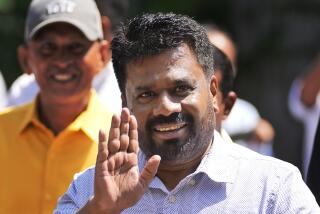Opposition Wins Election in Thailand : Asia: Group accused of buying votes defeats prime minister, announces formation of coalition government.
- Share via
BANGKOK, Thailand — In a major political shift for Thailand, the main opposition party, which was accused of widespread vote fraud in national elections, on Sunday defeated Prime Minister Chuan Leekpai’s efforts to win a second term and announced the formation of a coalition government.
Banharn Silpa-archa, leader of the victorious Chart Thai, or Thai Nation, party, told a news conference early today that he had reached an agreement to share power with five other parties, giving the coalition a combined 216 seats out of a total 391 places in the lower house of Parliament.
Final unofficial returns gave Chart Thai 93 seats, ahead of Chuan’s Democrat Party with 86 seats. In a surprise development, the devout Buddhist Palang Dharma, or Force of Justice, party, which saw its presence in Parliament cut nearly in half, announced that it would join the government.
Banharn, an old-fashioned political boss from the central city of Suphan Buri, said he would head the next government as prime minister. He announced a seven-point plan to improve the quality of life in Thailand, which has suffered in recent years because of the convulsions of rapid economic development.
“I am ready to be in the opposition,” a gloomy Chuan told a news conference Sunday night, as the returns showed a trend against him. Chuan was forced to dissolve his government in May after two years and eight months in power, the longest term ever served by a civilian prime minister.
He was swept to power in 1992 on a wave of pro-democracy sentiment that followed violent street demonstrations against military interference in politics. While Chuan is personally respected for his integrity in office, his party lost credibility in a land scandal.
Chuan’s squeaky-clean image contrasts sharply with the public image of Banharn, the head of Chart Thai’s well-oiled political machine.
Widely known as Deng because his diminutive size draws comparisons with China’s senior leader, Deng Xiaoping, Banharn is a multimillionaire businessman who has variously served as minister of finance, industry, Interior and commerce.
Banharn exercises absolute political control over Suphan Buri, the provincial capital where there are six high schools named after Banharn and his wife, Jamsai, as well as parks, gardens and a bell tower.
Banharn has been on the defensive for much of the campaign because his party has been widely accused by non-governmental organizations and poll monitoring groups of using millions of dollars to buy the votes of entire communities.
Banharn’s skills in dispensing cash during the campaign became so well-known that the Thai media dubbed him a “walking ATM machine.”
In one rural town on Thursday, police arrested a couple on charges of possessing $44,000 in Thai currency stapled to slips with the names of Chart Thai candidates in the area. Another Chart Thai official was arrested Friday on vote-buying allegations.
Press reports said the politically savvy Banharn may have avoided a major international crisis at the start of his rule by agreeing not to appoint deputy party leader Watana Asavahame to a ministerial post. Watana had been denied a visa to visit the United States because of allegations of involvement in the narcotics trade.
But newspaper reports said that Banharn promised Palang Dharma leader Thaksin Shinawatra that, in return for joining the coalition, Watana would not be given a top job. The inclusion of the Palang Dharma faction appeared to indicate that the old rift between pro-democracy forces and conservative elements that surfaced in 1992 had now been laid to rest.
More to Read
Sign up for Essential California
The most important California stories and recommendations in your inbox every morning.
You may occasionally receive promotional content from the Los Angeles Times.













